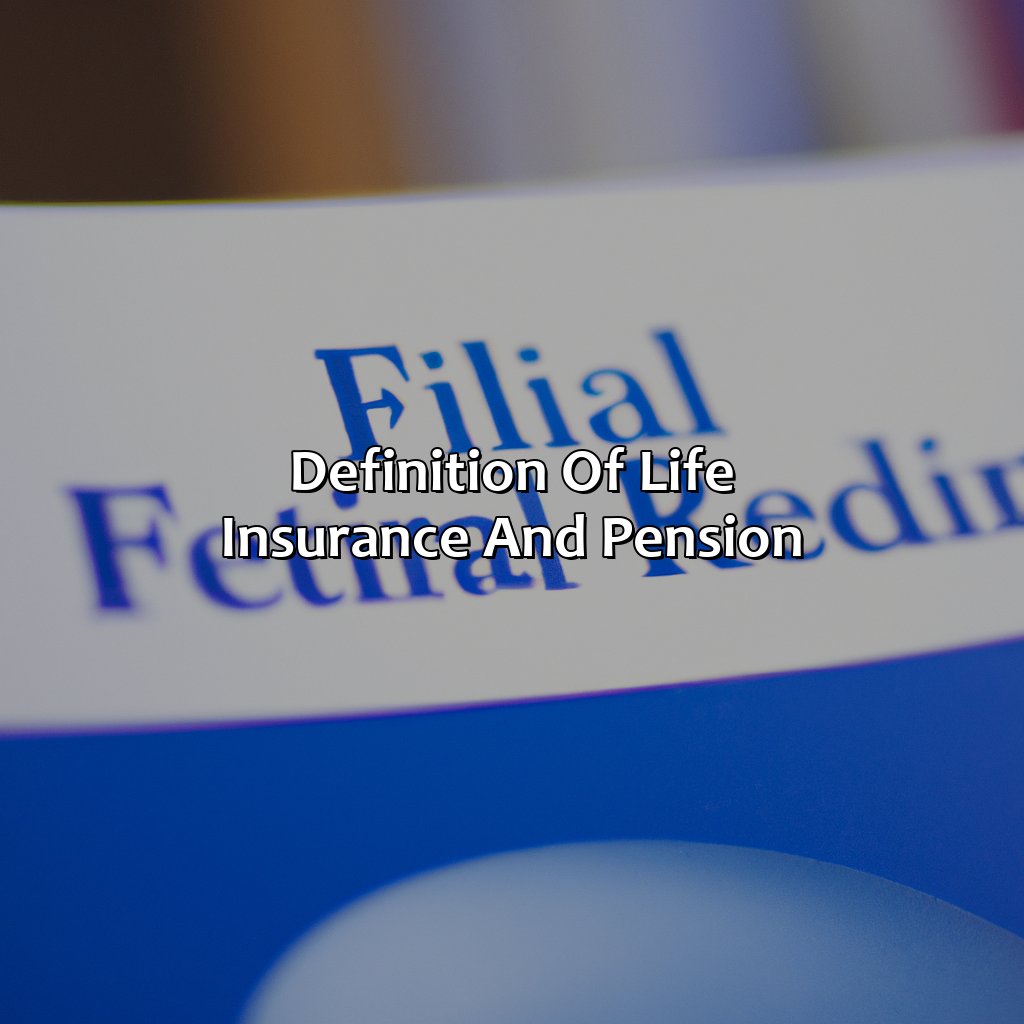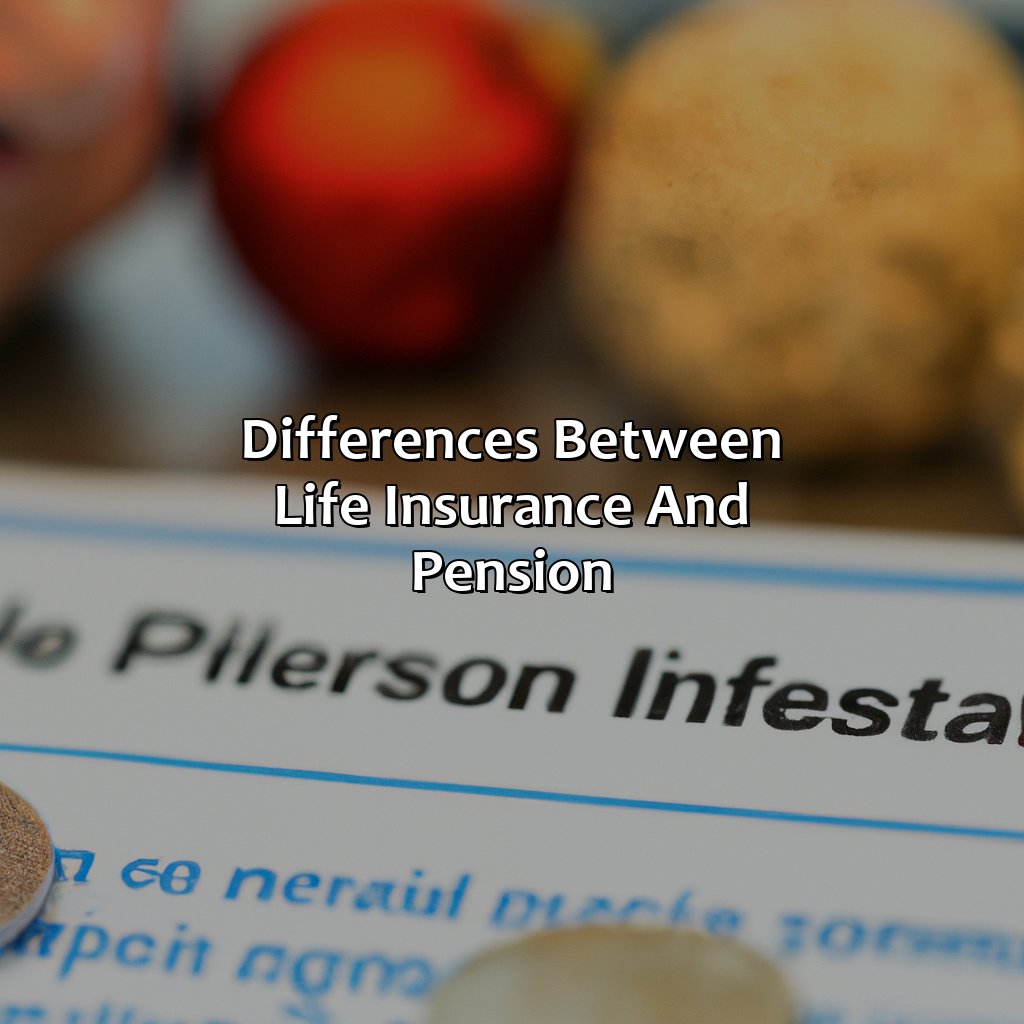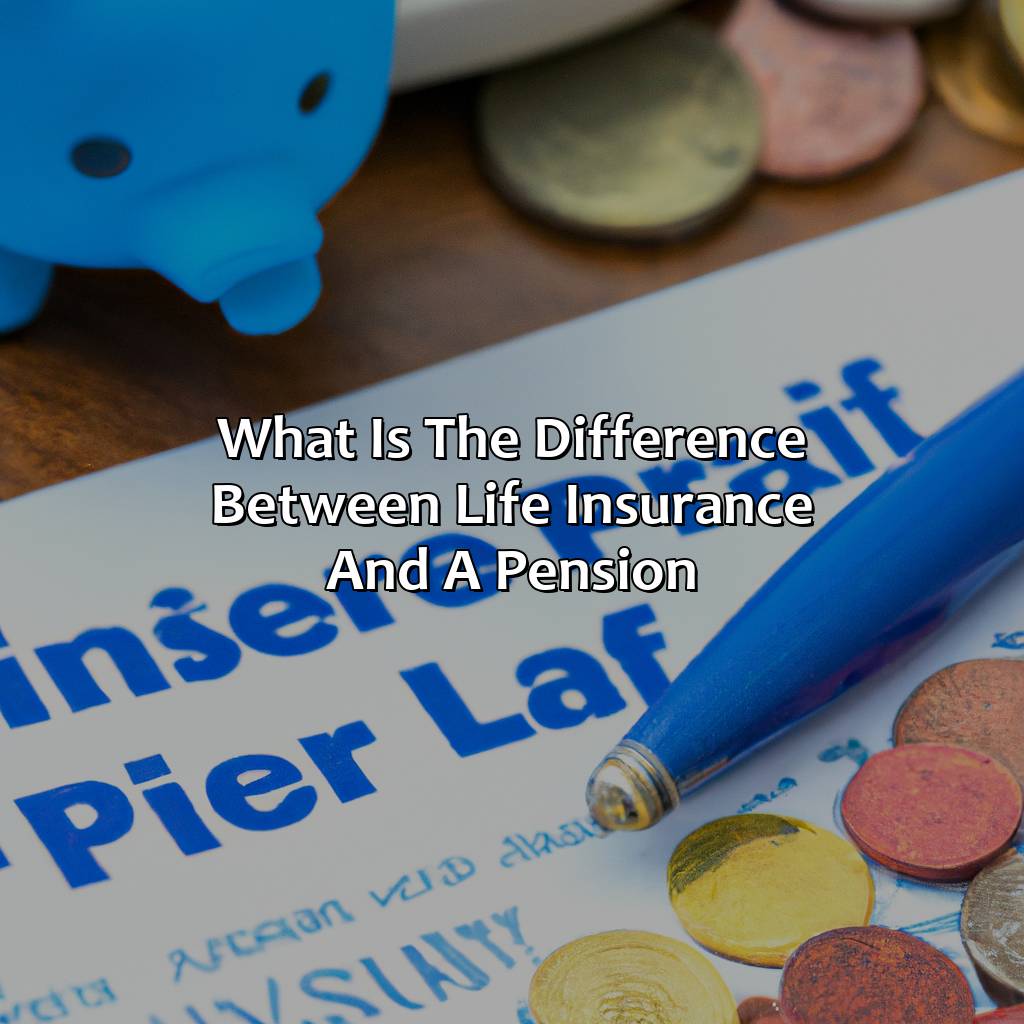What Is The Difference Between Life Insurance And A Pension?
Key takeaway:
- Life insurance provides a lump sum payout to beneficiaries upon the death of the policyholder, while a pension pays out regular income during retirement.
- The purpose of life insurance is to provide financial security for dependents, while the purpose of a pension is to provide retirement income.
- Benefits of life insurance include providing for dependents, paying off debts, and providing estate planning benefits. Pension benefits include regular income during retirement and potential tax advantages.
- Life insurance payouts are generally tax-free, while pension income is usually taxable.
- When choosing between life insurance and a pension, factors to consider include age, income level, dependents, and overall financial goals.
- Advantages of life insurance include flexibility and the ability to customize coverage, while advantages of a pension include guaranteed income and employer contributions.
Are you confused about life insurance and pensions? Whether you re protecting your family now or planning for retirement, understanding the difference between these two financial products is crucial. Let s explore the key distinctions between life insurance and a pension, so you can choose what s right for you.
Definition of Life Insurance and Pension
In the world of financial planning, life insurance and pensions are two key elements that provide long-term security for individuals and their families. Life insurance is essentially a contract between a policyholder and an insurer, where the policyholder pays regular premiums to receive a lump sum payment in the event of their death. This payment can help provide financial support for dependents and cover expenses such as funeral costs.
On the other hand, a pension is a retirement savings plan that helps individuals build up a fund for their later years. Contributions to a pension are made either by the individual, their employer, or both, and the accumulated funds are invested to provide a regular income during retirement. Unlike life insurance, a pension does not pay out in the event of death but instead provides a regular income stream throughout the retirement period.
It’s important to note that life insurance and pensions can often be used in conjunction with one another to provide comprehensive coverage and financial security. While life insurance may be more suitable for those with dependents or significant debts, a pension is an important tool for retirement planning and building financial stability in later life.
According to a report by the World Economic Forum, global life expectancy has increased by 5 years since the turn of the millennium, highlighting the need for long-term financial planning and security.

Image credits: retiregenz.com by David Duncun
Differences between Life Insurance and Pension
Wanna know the difference between life insurance and a pension? Let’s discuss their purpose, benefits, and taxation. This’ll help you make a smart decision when it comes to these financial choices.

Image credits: retiregenz.com by Joel Jones
Purpose of Life Insurance and Pension
Life insurance and pensions serve different purposes, but are both important in securing one’s financial future. Life insurance provides financial protection for loved ones in case of the policyholder’s death, while pensions provide a source of income during retirement. While life insurance pays out a lump sum upon the policyholder’s death, pensions offer regular payments to support individuals in their golden years. Each strategy serves different objectives and requires separate considerations depending on individual circumstances.
As for unique details, life insurance often covers specific periods of time while pensions last until the end of the recipient’s life. Additionally, life insurance policies offer various types of coverage such as term or permanent coverage, while pension options vary from plan to plan.
Interestingly, pensions have been around since ancient Rome when soldiers would receive a form of pension upon retirement known as “aerarium militare.” Over time, government-sponsored pensions emerged to support aging populations and private companies followed suit to provide similar benefits to their employees. Today, pensions continue to play an essential role in ensuring financial security for retirees.
Secure your future with these two options: Life insurance for when you die, and a Pension for when you’re too old to enjoy it.
Benefits of Life Insurance and Pension
When it comes to securing one’s financial future, two commonly used tools are life insurance and pension schemes. These financial instruments offer several benefits that can cater to different needs of individuals and organizations.
- Life Insurance: Life insurance offers a payout in the event of the policyholder’s death or terminal illness diagnosis. It provides financial protection for families who have lost their main sources of income due to unfortunate circumstances. Life insurance also serves as an investment option with a savings component where policyholders can accumulate cash value over time.
- Pension: Pension plans offer a steady source of income after retirement. Contributions made towards pension schemes are tax-deductible, making them an attractive option for employees who want to save for their retirement years actively. Pension plans operate like an annuity, providing payouts at regular intervals, depending on the plan’s terms and conditions.
- Tax Benefits: Both life insurance and pension schemes offer significant tax benefits. With life insurance policies, premiums paid can be deducted from taxable income; additionally, payouts received upon policy maturity or death are generally tax-free. With pension plans, contributions made towards collecting money for your retirement enjoy tax deductions up to a certain limit set by government regulations.
It is crucial to understand that both life insurance and pension schemes differ in their coverage scope, returns offered, and taxation regulations.
A notable example of how these tools can help is the case of Heather Petersen. After her husband died suddenly from a heart attack while driving home from work at age 45, Ms. Peterson was left penniless with no savings or income stream. However, because her late spouse had purchased a life insurance policy that offered a payout ten times his annual salary plus his employer-matched pension plan premiums when he retired later in life – she was able to maintain financial stability following his death.
Death and taxes may be the only certainties in life, but at least with life insurance and pensions, you can plan for both.
Taxation of Life Insurance and Pension
When it comes to the taxation of life insurance and pension, there are some differences to be aware of. While both may offer tax advantages, they differ in how they are taxed and when benefits are received.
- Life insurance typically offers tax-free death benefits to beneficiaries, while pensions involve taxable income at retirement age.
- Additionally, life insurance may offer tax-free cash value accumulation and withdrawals if structured properly.
It is important to understand the specific tax implications of each option before making a decision. Consulting with a financial advisor or tax professional can provide clarity on the best approach for individual circumstances.
Don’t miss out on potential tax advantages by not exploring all available options. Take the time to research and understand the nuances of taxation for life insurance and pensions to make informed decisions for long-term financial planning.
Deciding between life insurance and a pension is like choosing between a hot date and a long-term relationship – it all depends on your priorities and what you’re looking for.
When to Consider Life Insurance and Pension
Wondering if life insurance or pension is the right choice? It’s tricky, but there are factors to help. Age, family and budget all play a role. This section gives insight into Factors to Consider When Choosing Life Insurance or Pension. Plus, the Advantages and Disadvantages of Life Insurance and Pension.

Image credits: retiregenz.com by Adam Arnold
Factors to Consider When Choosing Life Insurance or Pension
When deciding whether to opt for financial security through life insurance or traditional pensions, several factors must be considered. These include age, income, and overall investment strategy. First, determine if one’s budget supports premiums set by the chosen life insurance provider. Additionally, research pension schemes provided by employers to ensure they align with future objectives. Finally, consider other potential investments that would complement either option.
The key factors to consider are:
- Financial ability to accommodate premiums
- Researching employer pension plans
- Examining future investment options
It is important to note that while both life insurances and pensions provide financial support in retirement years, they differ in execution and considerations.
There are specific factors around each option that are more beneficial depending on individual circumstances and long-term goals.
According to a recent study conducted by CNBC on life insurances – nearly half of Americans aren’t covered by any personal life insurance policy at all. Life insurance is like betting against yourself, while a pension is like betting on your future self – choose wisely.
Advantages and Disadvantages of Life Insurance and Pension
When to Opt for Life Coverage and Retirement Package?
Life insurance and pension are two different financial products that provide coverage at different stages of life. Here are some important considerations to keep in mind:
Advantages and Disadvantages:
- Life Insurance:
- Advantages:
- Provides a lump sum payment to beneficiaries.
- Can be used as an inheritance, estate planning.
- Some policies offer cash value accumulation.
- Disadvantages:
- Premiums can be expensive based on the plan.
- Some policies require medical exams.
- May not cover pre-existing health conditions.
- Pension:
- Advantages:
- Provides a regular income after retirement age.
- Employer-sponsored pensions often have matching contributions.
- Can include tax benefits based on location and plan type.
- Disadvantages:
- Limited access to funds before reaching retirement age.
- Potential changes in plan structure or employer contribution.
- Dependent on pension funds’ performance.
It’s important to understand the unique advantages and disadvantages of each product before making a policy decision.
Other Considerations:
Before taking out a policy, consider your life stage, future goals, dependents’ needs, and financial. For those younger than 50 with dependent children, life insurance can help provide financial support in case of unexpected circumstances. Pension plans are typically considered when one is nearing retirement age or looking for long-term saving options.
Need Additional Help?
Consider working with a licensed financial planner knowledgeable about the best plans, providers, differences between policies/retirement packages depending upon specific individuals’ goals and desired outcomes.
Planning for Retirement:
Start early by exploring various types of insurance options, pension plans, savings accounts/emergency funds that provide appropriate coverage according to individual lifestyle/geography-based needs at different life stages. Remember to re-evaluate annually and adjust based on changing situations like job change, additional dependents, or other changes in personal circumstances.
Five Facts About the Difference Between Life Insurance and a Pension:
- ✅ Life insurance provides a lump sum payment to beneficiaries upon the policyholder’s death, while a pension provides regular payments during retirement. (Source: Policygenius)
- ✅ Life insurance policies can include additional benefits, such as accelerated death benefits and riders for long-term care, while pensions do not offer these options. (Source: Forbes)
- ✅ Life insurance premiums are typically based on the policyholder’s age, health status, and coverage amount, while pension payments are determined by the amount of contributions made and the length of time in the plan. (Source: Investopedia)
- ✅ Life insurance can be purchased by individuals at any time, while pensions are typically provided by employers or the government as part of employee benefits or social security programs. (Source: Nolo)
- ✅ Both life insurance and pensions can be important components of a comprehensive financial plan, providing financial security to individuals and their loved ones. (Source: The Balance)
FAQs about What Is The Difference Between Life Insurance And A Pension?
What is the difference between life insurance and a pension?
Life insurance and a pension are two completely different things. Life insurance provides financial protection to your loved ones in case of your untimely death, while a pension is a retirement savings plan that provides a regular income after you retire.
Is life insurance or a pension better?
It depends on your financial needs and goals. If you want to ensure that your loved ones are financially protected after your death, life insurance is important. If you want to ensure that you have a regular income after retirement, a pension is important. Ideally, you should have both.
Can I get life insurance and a pension from the same source?
Yes, some insurance companies offer both life insurance and pension plans. You can also get a pension plan through your employer, while your life insurance can be purchased independently.
Do I need life insurance if I have a pension?
Yes, life insurance is still important even if you have a pension. Your pension will only provide income for you during retirement, but in case of your untimely death, your loved ones may still need financial support. Life insurance can provide them with the financial protection they need.
How much life insurance do I need if I have a pension?
The amount of life insurance you need depends on your personal financial situation and the needs of your loved ones. A general rule of thumb is to get a policy that is 10-12 times your annual income. This will ensure that your loved ones have enough financial support to cover expenses such as funeral costs and outstanding debts.
Can I use my life insurance to fund my pension?
No, life insurance and pension plans are separate financial products. You cannot use the money from your life insurance policy to fund your pension. However, you can use your pension savings to purchase a life annuity, which will provide a steady stream of income for the rest of your life.
